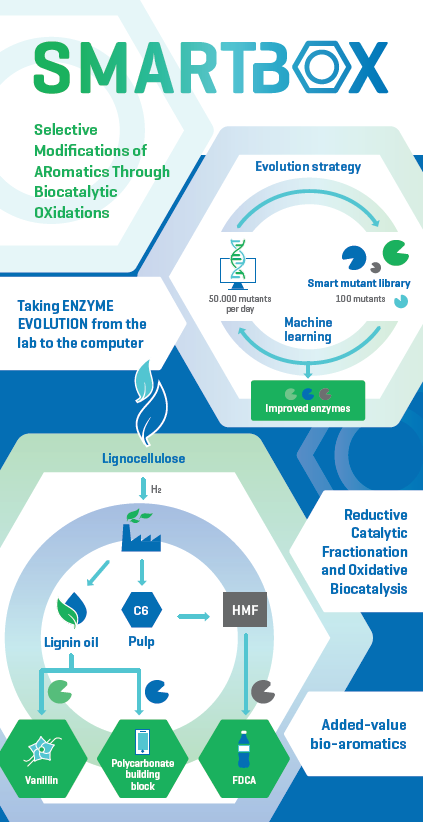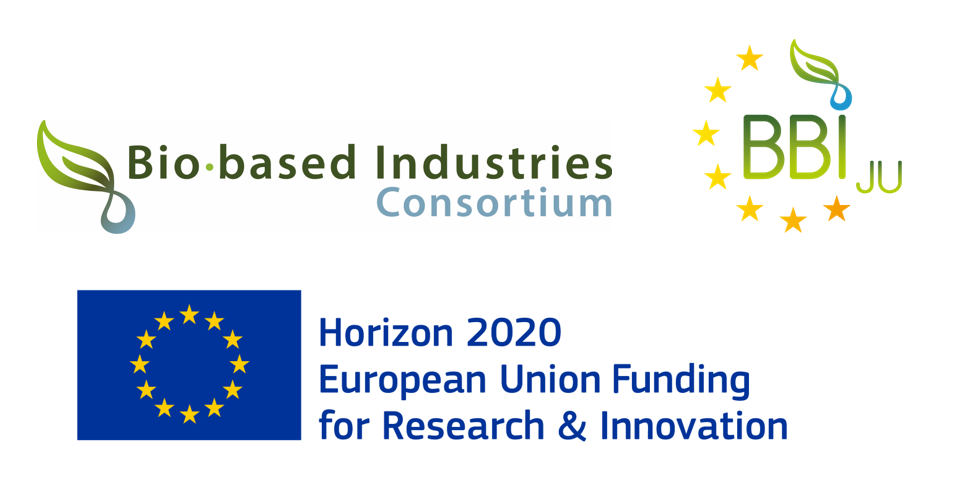Selective Modifications of ARomatics Through Biocatalytic OXidations
As Research and Innovation Action, SMARTBOX will fill the European innovation pipeline with completely new biobased products and sustainable processes. Within SMARTBOX, eleven participants from eight European countries will work together to develop innovative ways of transforming biomass into added-value bio-aromatics. The long-term ambition of SMARTBOX is to contribute to the Sustainable Development Goals of the United Nations by providing solutions to decouple our economy from fossil feedstocks.
SMARTBOX builds upon:
1. Computational enzyme engineering
Oxidative enzymes have the potential to substantially improve the economic and environmental sustainability of biorefineries. Enzyme-based processes rely on costly and relatively slow enzyme engineering technologies to improve the activity, selectivity and robustness of the enzymes. The SMARTBOX project is designed to address this issue by further developing and applying state-of-the-art computational enzyme engineering methods. This will reduce the costs and time associated with enzyme engineering by several factors. The ultimate ambition is to make oxidative biocatalysis an effective approach in biorefining.
2. Reductive Catalytic Fractionation
The valorization of lignin remains a daunting challenge for biorefineries. Lignin’s conversion into aromatic specialty chemicals seems an alluring opportunity to increase its value substantially. Such a “lignin-to-chemicals” approach relies on lignin depolymerization as key technology. The persisting bottleneck is that a very complex mixture of multiple aromatic compounds is generated, complicating the production of added-value chemicals in high yield. Reductive Catalytic Fractionation (RCF) of biomass is an emerging technology to overcome this issue. Compared to conventional biomass fractionation technologies, RCF results in the formation of a lignin oil that displays a much more narrow product spectrum. By connecting RCF and oxidative biocatalysis for the very first time, added-value lignin applications will be enabled.
3. Added-value bio-aromatics
Biorefineries should add value to biomass, that is carbohydrates and lignin, in a limited number of processing steps. Only then will they be sustainable from an economic and environmental perspective. SMARTBOX exploits the synergy between two highly selective technologies: Reductive Catalytic Fractionation and oxidative biocatalysis. The intrinsic characteristics of both allow the transformation of biomass into added-value bio-aromatics, such as vanillin, polycarbonate building blocks and FDCA. The bio-aromatics developed in SMARTBOX target the flavors and fragrances industry, the polycarbonate industry and the specialty polymers industry.

ACTIVITIES of the Bio Base Europe Pilot Plant
BBEPP is leading the overall project management, dissemination and exploitation activities as well as the workpackage for Process Development.
In particular BBEPP is going to:
- Improve the production titers of the key enzymes for improved synthesis of FDCA, polycarbonate building blocks and vanillin.
- Explore purification strategies for above mentioned bio-aromatics.
- Demonstrate the performance of the integrated process on industrial scale on 150 L.
- Validation will include the enzyme production and downstream processing of FDCA, polycarbonate building blocks and vanillin.
PARTNERS
- Bio Base Europe Pilot Plant, BE (Coordinator)
- University of Groningen, NL
- ZYMVOL Biomodeling, ES
- Universidade NOVA de Lisboa, PT
- Universita degli Studi do Pavia, IT
- KU Leuven, BE
- AVA BIOCHEM, CH
- B4PLASTICS, BE
- COVESTRO Deutschland, DE
- BORREGAARD, No
- QUANTIS, CH
SUPPORTED by:
European project funded by the Bio-Based Industries Joint Undertaking under the European Union’s Horizon 2020 research and innovation programme under grant agreement number 837890.



 webdesign
webdesign